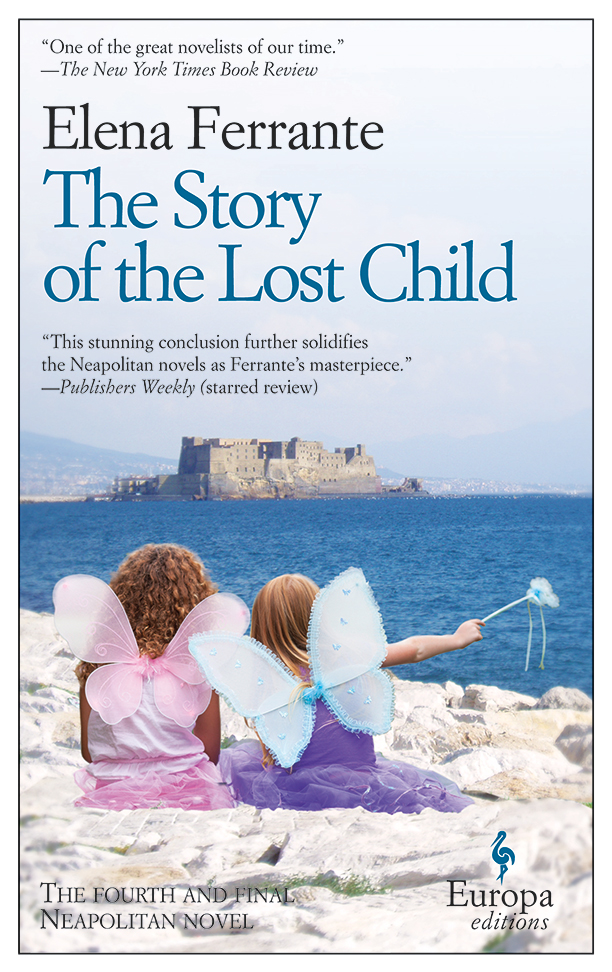The Story of the Lost Child
by Elena Ferrante, translated by Ann Goldstein
reviewed by Jennifer Kurdyla
I grew up hearing stories about my mother’s mother: about her tiny ears, about how she fed a family of six children with one corner cabinet of groceries, about her only piece of jewelry, a single gold charm bracelet. This kind of lore often drives our continuous fascination with maternity, despite its many potential sources of resentment and unhappiness.
Throughout her work, but especially in her Neapolitan Novels quartet and its final installment, The Story of the Lost Child, just named a Top Ten Book of the Year by The New York Times, Elena Ferrante explores a very different side of motherhood and of all female relationships. In the tale of lifelong friends Elena and Lila, which spans the second half of the twentieth century, Ferrante gives us characters who think things like, “Where is it written that lives should have a meaning?” These are not cookie-baking moms. Elena and Lila’s carnal sexuality, their sense of vengeance, and their loyalty to each other have spawned a revolution around the world. Rather than by upending patriarchal society, Ferrante suggests that women derive their power from the unknowns of femininity. As a writer who has remained anonymous throughout her career, she embodies this credo.
By the quartet’s fourth book, Elena and Lila’s dramas might no longer seem shocking to readers. As girls they endured hardships of every stripe, with long periods of separation that made these things at once easier and more difficult to bear. But The Story of the Lost Child takes the drama to a new height; as the two women enter their forties, their travails are exacerbated to include mafia murders and conspiracies, drugs in the neighborhood, and the revelation of affairs, pregnancies, and secret children. Ferrante’s short chapters make for rapid scene cuts that perfectly match the propulsive quality of the narration. They also reflect the mercurial mind of our narrator, Elena, as she pens the story of her friendship in painstaking detail, preserving every feeling and focusing our attention on these very particular, unforgettable lives.
Throughout the book, Ferrante uses the tropes of motherhood as a grounding device. Lila and Elena are always mothers, daughters, and sisters. But as friends, they’re constantly at odds with one another. Their pregnancies are simultaneous: tortuous for the former, organic for the latter. Then, after their two daughters, nicknamed Tina and Imma, are born, it’s Lila who ironically radiates enough motherly affection for both little girls, while Elena becomes reabsorbed in her writing career. At the same time, Elena realizes that her own mother’s sickness enables her to be comfortable around her. “When she embraced me before I left,” she says, “it was as if she meant to slip inside me and stay there, as once I had been inside her. That contact with her body, which had irritated me when she was healthy, I now liked.”
For Lila, the pain of motherhood engenders a different outcome, one that provides the most dramatic event of the novel, as well as its title. It also gives meaning to Elena’s struggle to tell the story of this friendship in the pages we read and in other books she writes in the novel. The “lost child” is not only literal, a mystery that no one in the novel solves, but symbolic of the two women whose own childhoods are lost to the fact that, in order to be adults—and mothers themselves—they have to eclipse their own daughters’ wants and desires.
When Lila, who is less able to fulfill her own desires in life, is faced with the lack of an alternative identity as a mother, she, who was “so active, so courageous—erased herself, and terrified, became nothing.”
Elena’s attempt to un-erase her friend is as much a final defiant act of dominance as it is a testament to her quest “to seek on the page a balance between her and me that in life I couldn’t find even between myself and me.” The resulting ambiguity may not be a perfect “balance,” but it is an authentic conclusion to this messy, angry novel. It underscores Elena’s statement that “Unlike stories, real life, when it has passed, inclines toward obscurity, not clarity.” These novels don’t seek to find what’s lost, but to pay homage to the way that losing is, itself, divine.
Published on December 7, 2015

